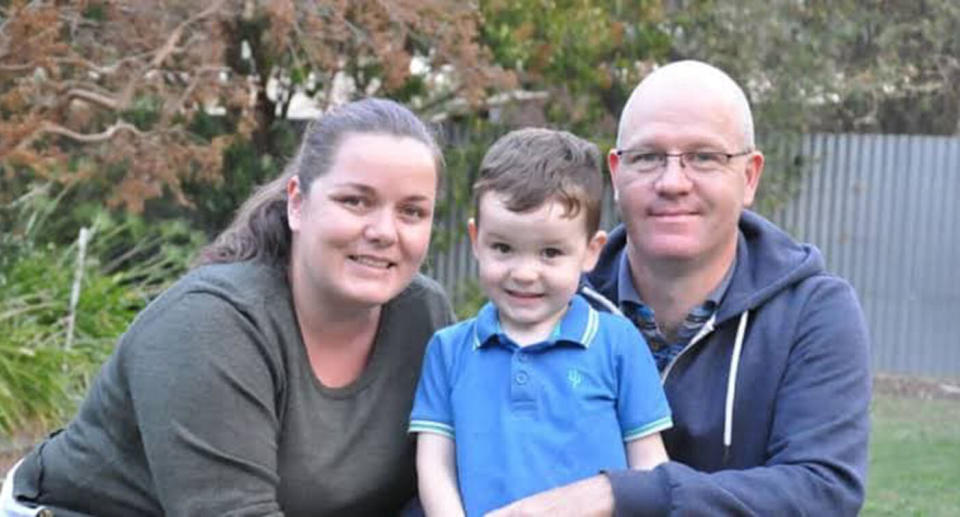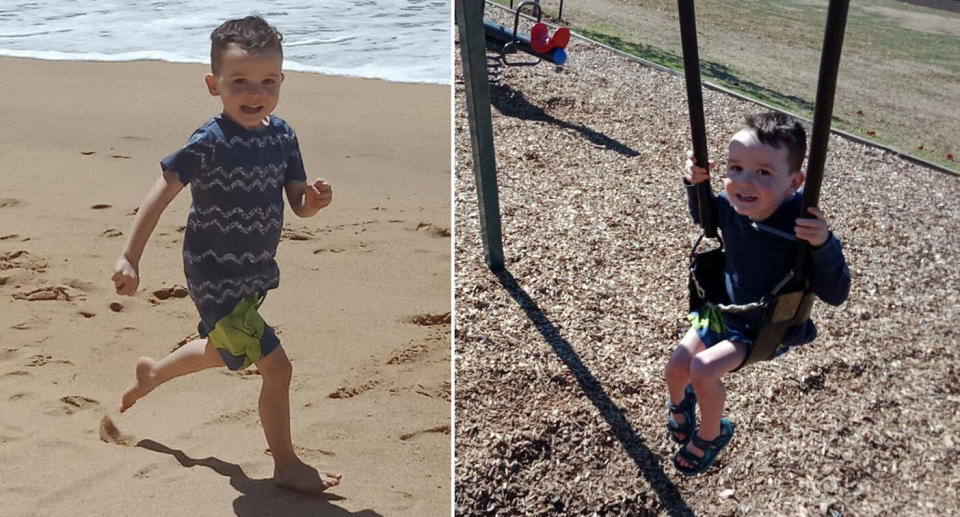'We're drained': Family with sick son, 3, given 28-day deadline to leave Australia
A distressed family is facing the prospect of leaving their jobs, breaking the lease on their home and pulling their child out of school to relocate overseas after their son was found to be a ‘burden’ to Australia because of his life-threatening disorder.
Christine and Anthony Hyde are an Irish couple who have lived in Australia for more than a decade.
But more than three years after applying to become permanent residents, their applications have been denied and the family given 28 days to leave the country from Tuesday.

“We’re drained,” Ms Hyde, an assistant principal in the small Victorian town of Seymour, told Yahoo News Australia.
“We’ve got a lease, we’ve got animals and jobs. Twenty-eight days is just... I don’t even know what we can do with that. It’s awful.”
The residency refusal has been based off three-year-old Darragh’s cystic fibrosis (CF) and the medication that allows him to live a ‘normal’ life.
The drug, Kalydeco, costs a whopping $300,000 per patient per year.
It is listed on the pharmaceutical benefits scheme (PBS) and allows the Hyde family to access it for a subsidised cost of $40 per month.
Ms Hyde acknowledges the drug is an expensive one, but says it is vital for her son.
She also feels like her family are contributing members of the community – not the burden they have been labelled.

“Being on that drug for Darragh is almost reversing the impact of CF for him. It means he will go on to live a normal life,” Ms Hyde said.
“I get that’s why it’s expensive. But I also think we do a fair job of giving back.
“We’re not a family who sponge off people. My son will go on to do work, he’s not going to stay home, I can tell you that. I believe we have good ethics.”
The family is now appealing to Immigration Minister David Coleman in a last-ditch effort for an intervention.
If an intervention is unsuccessful, the family will be required to leave Australia – and the lives they have built – on June 18.
While they will be permitted to visit Australia, they will not be allowed to live in the country again.

For Darragh, Australia is the only home he knows. His parents have sheltered him from the immigration battle, only telling him: “We might be going on a plane soon.”
“He has no idea. He shouldn’t either, it’s not his fault,” Ms Hyde said.
“We haven’t been back to Ireland for six years. Darragh’s never left the country. He doesn’t know anywhere else but here.
“Had we been residents and then he was born, we would’ve been okay. If it was a different visa with a health waiver option, we could’ve stayed.
“So how can he be a burden when one way allows him to stay and the other doesn’t? It’s just frustrating,” she said.
Ms Hyde has spent $40,000 studying in Australia, finishing her Master’s degree in 2013. Her skill set as a special education teacher – combined with the support from the community – is a big drawcard for an intervention from the immigration minister.

Yahoo News Australia has contacted Mr Coleman for comment.
“If Mr Coleman or Mr Dutton could just agree to have a look at our case – that’s all we’re asking for,” Ms Hyde said.
“I think anyone with a heart and a bit of compassion could look at it and think, ‘Let’s give this family a fair go’. We’ve just got to be positive and stay hopeful.”
The family’s petition has gained almost 75,000 signatures.
A spokesperson for the Department of Home Affairs said it did not comment on individual cases, but said most visa applicants needed to meet the “migration health requirement set out in Australian migration law”.
“The health requirement is not condition-specific and the assessment is undertaken individually for each applicant based on their condition and level of severity,” the spokesperson said.
“It is an objective assessment to determine whether the care of the individual during their stay in Australia would likely result in significant costs to the Australian community or prejudice the access of Australian citizens and permanent residents to services in short supply.”
Further the spokesperson said primary criteria for the visa to be granted was that all members of the family unit satisfied certain requirements.
“If one of the members of a family unit does not satisfy these requirements, then the primary applicant will not meet the criteria for the grant of the visa,” the spokesperson said.
“This will ultimately mean that secondary applicants will not be able to be meet the requirements for the visa even if the primary applicant has met the requirements for the visa.”
Do you have a story tip? Email: newsroomau@yahoonews.com.
You can also follow us on Facebook, download the Yahoo News app from iTunesorGoogle Play and stay up to date with the latest news with Yahoo’s daily newsletter. Sign up here.



